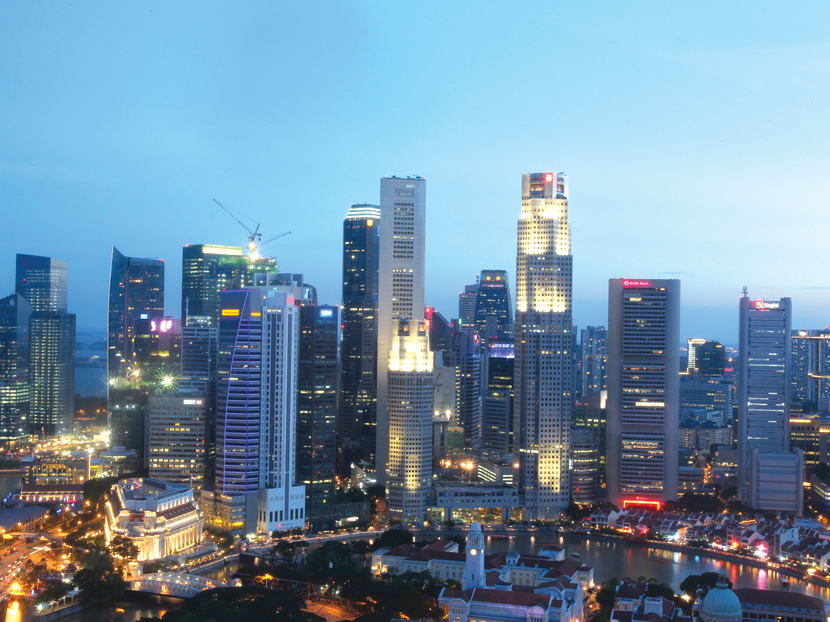Govt warns of lower pay rises as economy shows 2% growth
SINGAPORE — The Government cautioned on Wednesday (Feb 24) that wages are likely to increase at a slower rate this year given the challenging economic climate ahead, where lower oil prices and a prolonged slowdown in China could further weigh on companies and trade.
SINGAPORE — The Government cautioned on Wednesday (Feb 24) that wages are likely to increase at a slower rate this year given the challenging economic climate ahead, where lower oil prices and a prolonged slowdown in China could further weigh on companies and trade.
This comes as final estimates from the Government confirmed Singapore’s gross domestic product (GDP) grew last year at the weakest pace since the global financial crisis, giving rise to expectations from
economists that certain policies could be revised or even scrapped in the upcoming Budget to help the business community ease into a “modest” 1 to 3 per cent GDP growth expected this year.
Real median wages for full-time resident workers grew at 5.3 per cent last year, but this growth “may not be sustainable”, said Mrs Ow Foong Pheng, the Permanent Secretary for the Ministry of Trade and Industry (MTI), at a press briefing on Wednesday.
Demand for labour is expected to be more subdued this year given the “challenging near-term outlook for the Singapore economy”, thereby leading to more moderate wage growth, she pointed out.
In addition, the real average wages of resident workers in Singapore over the past five years, has outpaced labour productivity, a less than ideal situation “given the potential negative impact on our economic competitiveness”.
“In order for our economy to remain competitive and wage growth to be sustainable, wages should grow in tandem with productivity over the long term,” Mrs Ow added.
Singapore Business Federation’s CEO Ho Meng Kit agreed that it may not be sustainable for real wage growth to continue to outpace productivity gains without impacting Singapore’s economic competitiveness negatively. However, he noted that with the tight labour market, employers are still expected to give their employees some wage adjustments.
Singapore’s economy grew 1.8 per cent year-on-year during the October to December period last year, the MTI said yesterday, slightly lower than the 2 per cent estimate flagged last month.
GDP growth for the full year was similarly revised down to 2 per cent from 2.1 per cent previously, the weakest annual growth since 2009 when the economy was hit by the global financial crisis and shrank 0.6 per cent.
On a quarter-on-quarter seasonally adjusted annualised basis (q-o-q saar), the economy expanded by 6.2 per cent for the fourth quarter, extending from the 2.3 per cent growth in the third quarter.
On Wednesday, the Ministry noted that “global growth for the whole year is now expected to be marginally better than in 2015”, with support from advanced economies.
Meanwhile, IE Singapore, the agency driving the Republic’s external economy maintained the full-year growth projection for non-oil domestic exports at between 0.0 and 2.0 per cent.
Despite expectations for improving global growth, MTI cited four domestic drags to the Republic, namely weak external demand weighing on exports, risks of lower oil prices affecting rig orders in the marine & offshore segment as well as negative spillover effects on firms in the precision engineering cluster, a weakening momentum in construction, and labour constraints constraining labour-intensive sectors like food services.
“The situation appears to be increasingly challenging,” said Dr Tan Khay Boon, senior lecturer at SIM Global Education. “The weakness in the manufacturing sector is no longer confined to the electronics cluster. It has spread to the transport engineering cluster, especially the marine & offshore engineering segment due to the depressed oil prices. While the full employment continues to render support to a good performance in the wholesale & retail trade segment of the services sector, the possibility of interest rate hike, stock market volatility and capital flight may dampen the performance of the finance & insurance segment.”
With the Budget coming up in a month’s time on March 24th, economists said certain policies could be refined in consideration to the moderate growth expected.
Nomura analysts Mr Euben Paracuelles and Mr Brian Tan said: “We expect the foreign worker levy hikes scheduled for this year to be further delayed or even cancelled altogether. Instead, the government will likely place more focus on the SkillsFuture initiative introduced last year to encourage Singaporeans to improve their skills with continuing education and training.”
Most economists are not ruling out the possibility of easing, but emphasised they do not expect a revision in the central bank’s monetary policy stance at the next meeting in April.
“We maintain our view that the central bank will keep the monetary policy unchanged,” said UOB economist Francis Tan, as the Monetary Authority of Singapore’s (MAS) preferred indicator on their policy action dashboard is Singapore’s core inflation, which rose to 0.4 per cent last month from 0.3 per cent a month earlier.
The indicator, which excludes the costs of accommodation and private road transport, was unchanged for the full year forecast at between 0.5 and 1.5 per cent in the latest consumer prices report by the MAS on Tuesday (Feb 23).
The likelihood to shift the S$NEER to a neutral stance remains low, Mr Tan added, as it was only done during economic recessions or market crisis in the past.







